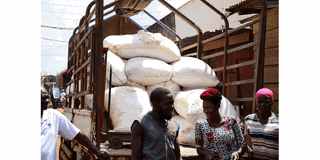Quality of Ugandan maize improved – Grain council

A lorry carrying sacks of maize at Jinja Industrial Area on August 6. PHOTO/ABUBAKER LUBOWA
What you need to know:
- This has been attributed to training of farmers, traders and processors on post-harvest management and good storage practices.
The Eastern Africa Grain Council (EAGC) has said the quality of maize in Uganda has started to improve, a year after the country faced a trade ban from Kenya, a major importer, over grain quality.
“We have started seeing improvement in how grain is being handled [in Uganda]. We call upon other partners in the private sector to continue this fight against the prevalence of aflatoxin,” Mr Paul Ochuna, the team leader of EAGC, told Monitor in an interview last Friday.
Mr Ochuna attributed this to the increased training of farmers, traders and processors on post-harvest management and storage practices by the government and private sector players. The EAGC brings together farmers, traders and processors.
In March last year, Kenya banned the importation of maize from Uganda over high levels of aflatoxin – the toxic substances in grains contaminated with fungi. The toxin causes cancer and other health complications.
But in July, the Kenyan government revealed that they were in talks with Uganda to get maize from the country, signalling changes in quality and response to shortages being experienced across the region.
Mr Ochuna said although the quality is improving, the contamination levels are still high and the grain production has declined in the previous season because of drought.
“We have some large grain traders who have approached us for maize but we don’t have that quantity and quality. Zambia is now supplying maize to Uganda because we don’t have maize,” he noted.
Mr Stanley Ahimbisibwe, the Assistant Commissioner for Quality Assurance and Standardisation at the Trade ministry, said the training is changing the attitude of farmers and processors on grain handling.
Mr Ahimbisibwe said a facility has been installed by one of the private sector players in Soroti District to remove aflatoxin from maize.
“We are working with development partners to train the micro and medium-sized enterprises and change their attitude to ensure that their products conform and comply with the national and international standards. Aflatoxin is a menace. This training to improve the quality of grains will increase the market share,” he said.
The Grain Council of Uganda last month asked government to ban the export of ungraded maize to avoid challenges such as distortion of quality, pricing and stifling the growth of Uganda’s grain processing sector.
Background
In 2021, Kenya, a country where maize is a major food crop, stopped the importation of maize from Uganda because of quality concerns.
Their main complaint about Ugandan maize, according to media reports, is the presence of aflatoxins in the maize.
As of 2018, the per capita consumption of maize in Kenya was 60 kilogrammes, equivalent to five kilogrammes per person per month.




